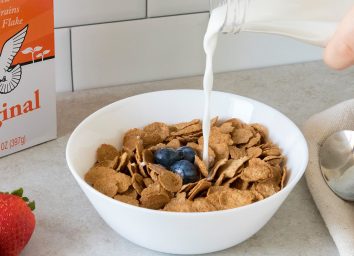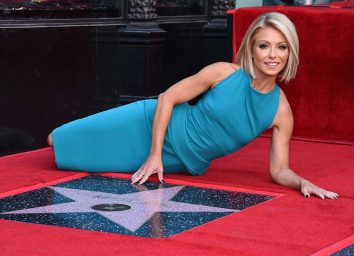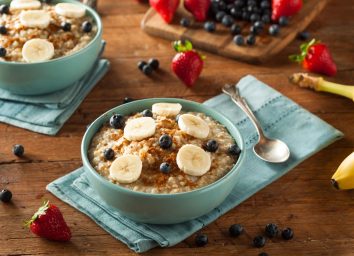20 Worst ‘Healthy’ Cereals
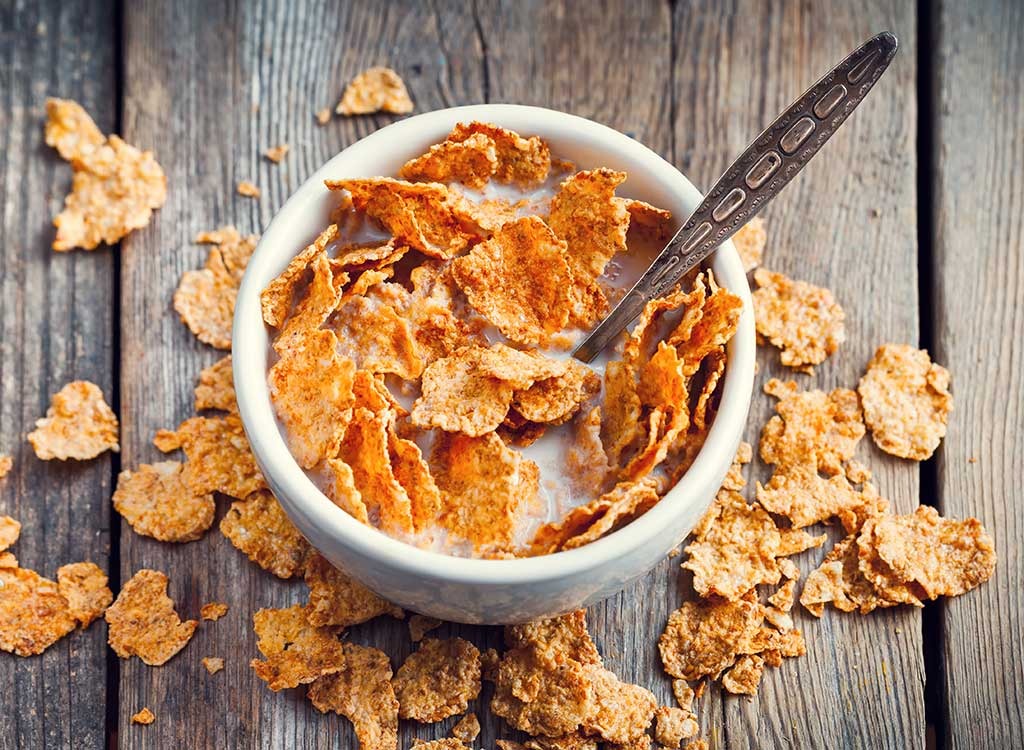
If you’re an avid Eat This, Not That! reader, you probably know by now that some classic morning meals—frozen waffles and pop tarts, we’re looking at you—are on a mission to crush your weight loss goals. And that’s because many of these breakfast foods are high in sugar and low in good-for-you nutrients like healthy fats, fiber, and protein that can help to propel us into the day feeling satisfied and energized. But not all diet offenders are easy to point out. Take, for example, healthy cereals.
Marketers began to catch on to the fact that people wanted breakfast foods that were low in sugar and high in nutrients. While you’d think that would mean companies would make whole grain cereals that were low in sugar, that’s not exactly what happened. Instead, brands just plastered health-focused words like “antioxidants” or “whole grain” onto their cereal boxes in an attempt to catch the eye of the unassuming dieter. The result? Healthy cereals became one in a long list of foods with health halos.
Because it’s so difficult to tell which boxes of grains are actually good for you—and which ones are nothing more than a marketing gimmick to take advantage of your quest for a better diet—we sought out to find some of the most misleading cereals on grocery store shelves. Watch out for these secret diet disasters, and don’t forget that being mindful of your morning meal doesn’t just stop in the cereal aisle. Vanquish those dessert-like breakfast foods so you can stay on top of your body goals by choosing the best breakfast foods for weight loss.
Eat This! Tip:
When you’re roaming the cereal aisle, make sure your box has at least 3 grams of fiber and fewer than 10 grams of sugar. Limiting yourself to 10 grams of sweet stuff per serving will be enough to satisfy your sweet tooth without overwhelming your blood glucose levels to the point you’ll suffer a sugar crash before lunch. High fiber foods will slow your body’s digestion of the sugars to prevent any energy-draining spikes in blood sugar. And don’t forget to always skim the ingredient list. A whole-grain should be listed as the first ingredient—not sugar—and ensure there are no artificial flavors, preservatives, colors, or partially hydrogenated oils.
Kellogg’s Smart Start Original Antioxidants
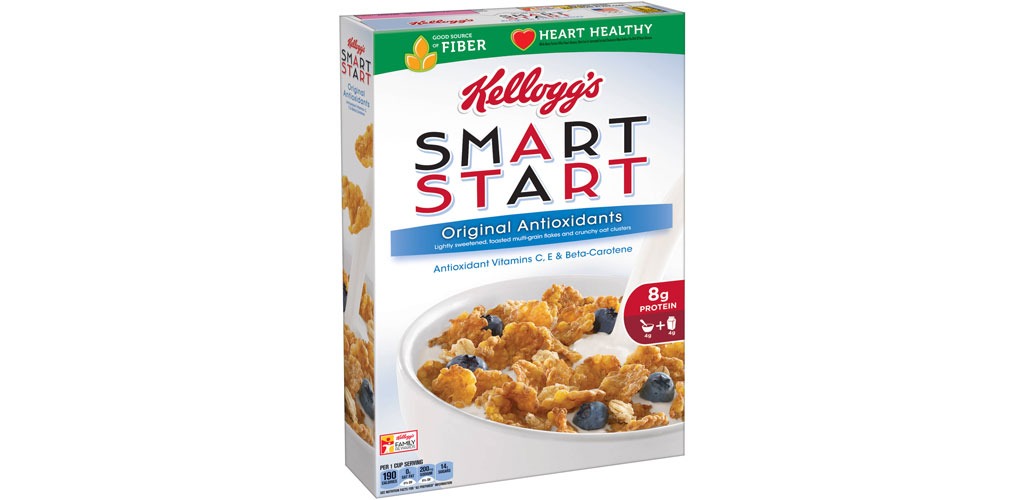
Per 1 cup: 190 calories, 1 g fat (0 g saturated fat), 200 mg sodium, 43 g carbs (3 g fiber, 14 g sugar), 4 g protein
What’s so smart about a high-sugar, low-fiber cereal? This box from Kellogg’s hijacks the claim, “antioxidants”—which are plant-based compounds that mop up inflammatory, cancer-causing free radicals—making the cereal sound healthier than it is. In reality, their box contains an inexcusable 14 grams of sugar per serving, as well as artificial flavors, colors, and potentially carcinogen-containing BHT. According to Lisa Moskovitz, RD, CDN, “BHT is still highly controversial and limited research exists on whether it is harmful to the body or carcinogenic,” but she added, “it is still recommended to avoid consuming large quantities.”
Kellogg’s Cracklin’ Oat Bran
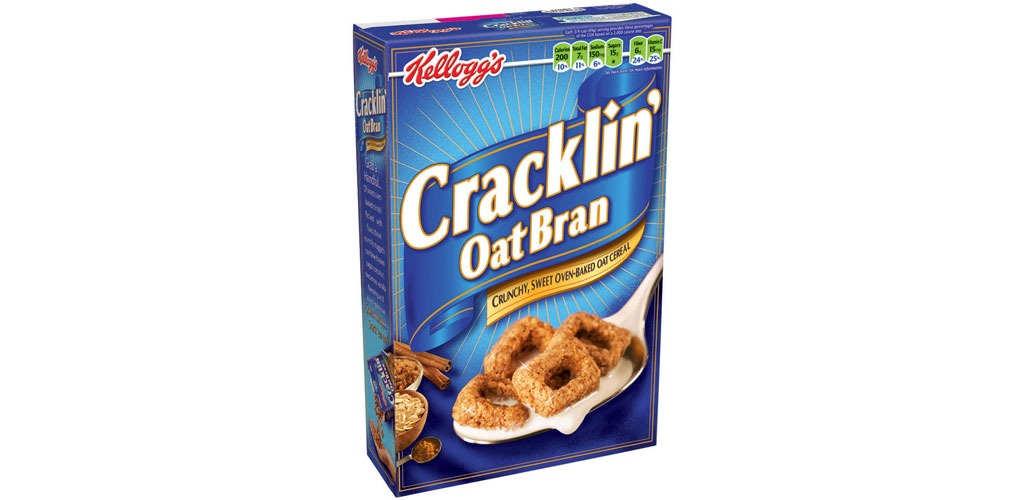
Per 1 cup: 267 calories, 9 g fat (4 g saturated), 180 mg sodium, 45 g carbs (8 g fiber, 19 g sugars), 5 g protein
It’s not just the nearly 20 grams of sugar that make this cereal less than wholesome. Cracklin’ Oat Bran also comes with a massive glut of palm and soybean oil that loads this box with inflammatory omega-6s and saturated fats.
Life Cinnamon Multigrain Cereal
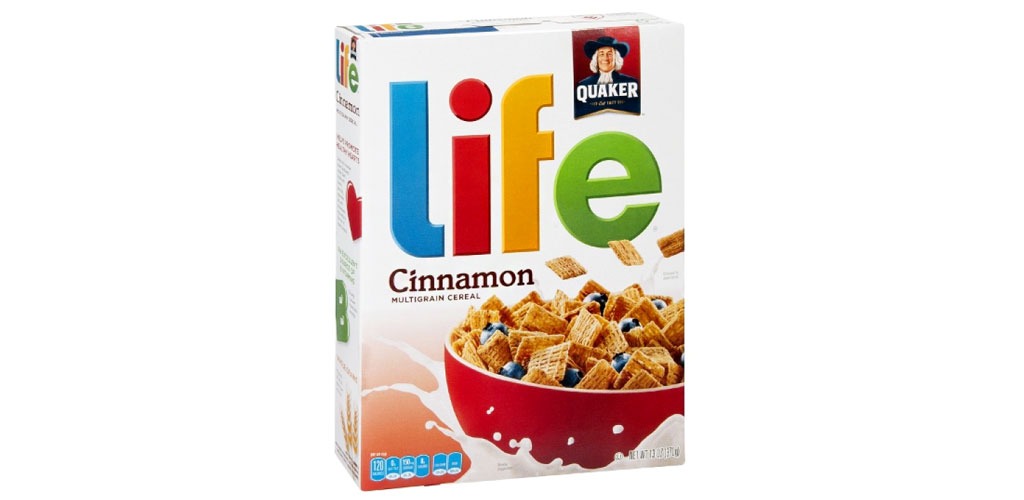
Per 1 cup: 160 calories, 2 g fat (0 g saturated fat), 200 mg sodium, 33 g carbs (3 g fiber, 11 g sugar), 4 g protein
Because it touts its 18 grams of whole grains on the front of the box, alongside words like “multigrain” and “plant foods,” you might initially think Life cereal was a safe choice—until, that is, you read the ingredient list. There you’ll see that the cereal pieces aren’t even made of whole grains, but a medley of flours (most of which, are in lesser quantities to the sugar that’s added). On top of that, Quaker also adds oil-derived artificial colors, Yellow 5 and 6.
Quaker Real Medleys Cherry Almond Pecan Multigrain Cereal
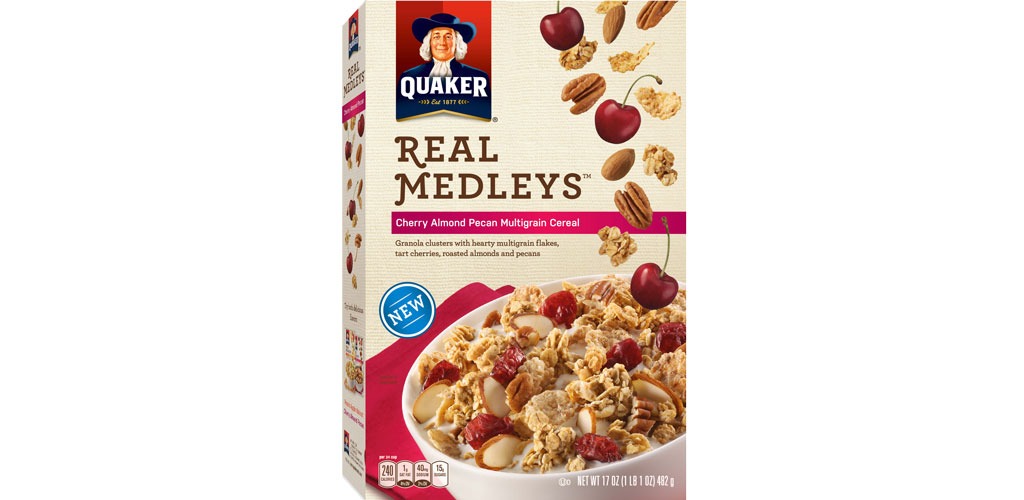
Per 1 cup: 320 calories, 9 g fat (1.5 g saturated fat), 50 mg sodium, 55 g carbs (4 g fiber, 20 g sugar), 7 g protein
At least Quaker realizes the amount of sugar (more than five Chips Ahoy cookies) they put in this box, with their tagline “Feed your sweet tooth and your, well, wholesome tooth.” Despite having whole grain rolled oats, wheat, brown rice, and corn flakes, there are only 4 measly grams of fiber per bowl. Plus most of those 7 grams of protein come from whey protein concentrate rather than the almonds or pecans.
Post Honey Bunches of Oats Whole Grain Honey Crunch
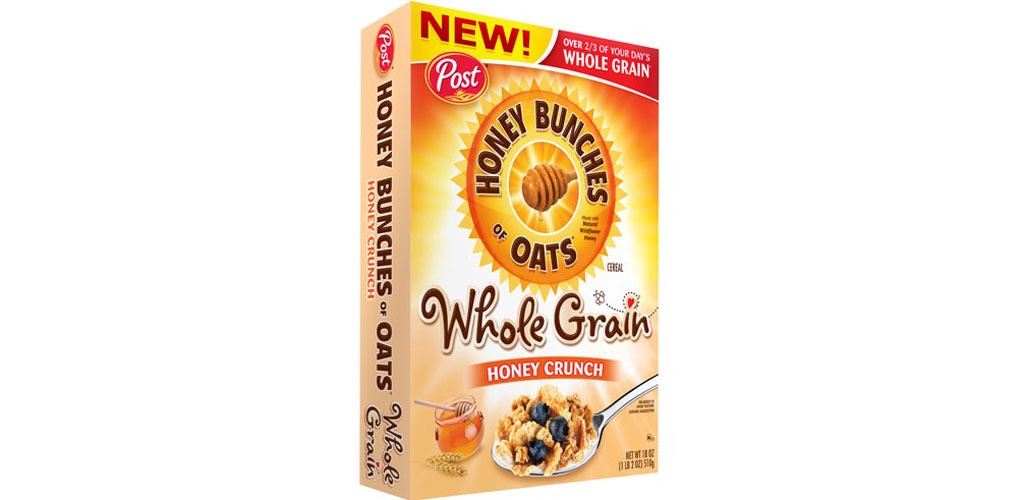
Per 1 cup: 220 calories, 3 g fat (0 g saturated fat), 150 mg sodium, 46 g carbs (4 g fiber, 12 g sugar), 4 g protein
When grabbing a box off the shelf, make a point of steering clear of the three C’s: crunch, crisps, and clusters. This trio is typically code for clumps of rice held together by sugar and fat, like in these Honey (aka corn syrup and caramel color) Bunches of Oats.
Kashi Heart To Heart Oat Flakes & Blueberry Clusters
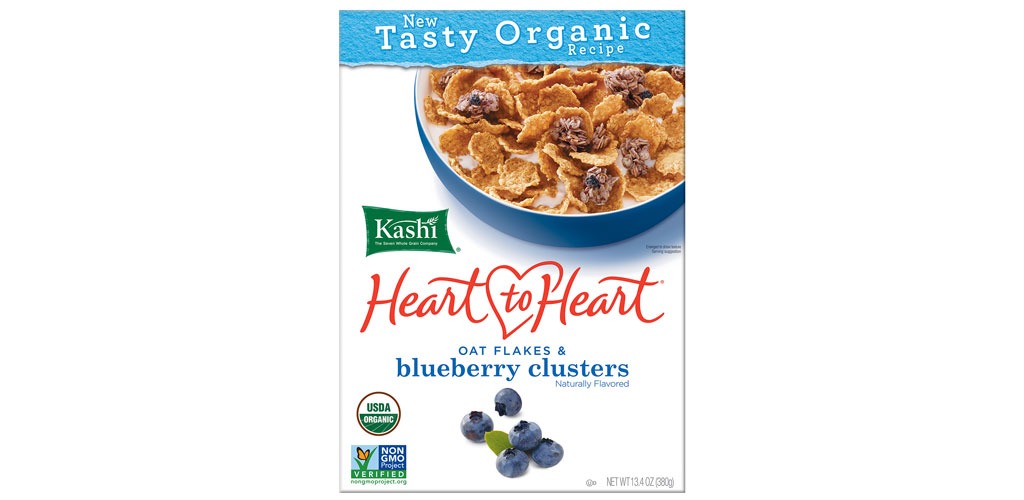
Per 1 cup: 200 calories, 2.5 g fat (0 g saturated fat), 125 mg sodium, 42 g carbs (3 g fiber, 11 g sugar), 5 g protein
We’re big fans of many of Kashi’s cereals, but this Heart To Heart Oat Flakes & Blueberry Clusters is higher than their average when it comes to sugar content. Remember, “clusters” is code for oats held together with syrups and oils. Instead, pick up one of the best pantry staples: Kashi 7 Whole Grain Flakes.
Good Morenings Waffle Crunch
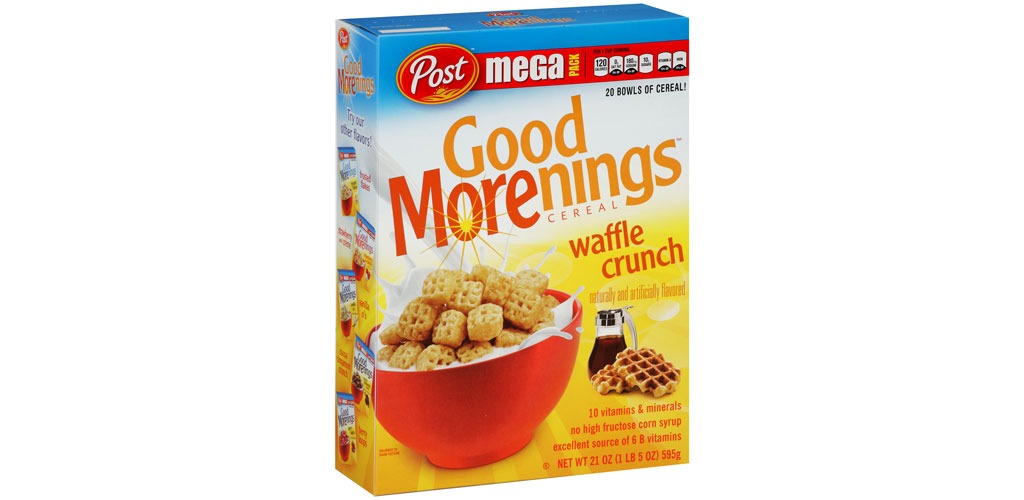
Per 1 cup: 120 calories, 1.5 g fat (0 g saturated fat), 180 mg sodium, 25 g carbs (1 g fiber, 10 g sugar), 2 g protein
How does a cereal called “Waffle Crisp” sound? Pretty unhealthy, right? What about “Good MOREnings?” Better? Not really. They’re essentially the same thing—same ingredient list, nearly identical nutrition information—just one is rebranded to make it appear healthier. It’s not. This cereal is one of the few remaining boxes that contain artery-clogging trans fat, partially hydrogenated soybean oil.
Cinnamon Chex
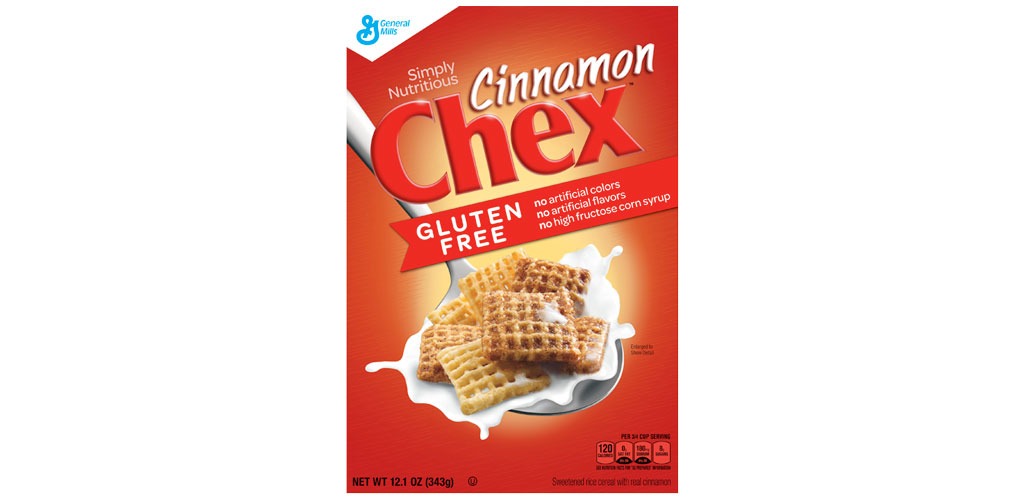
Per 1 cup: 160 calories, 3 g fat (0 g saturated fat), 240 mg sodium, 33 g carbs, (1 g fiber, 11 g sugar), 1 g protein
Gluten-free does not always mean healthy! Why? Well, this cereal delivers 160 calories of pure carbohydrates, 11 of which are sugars.
Special K Protein
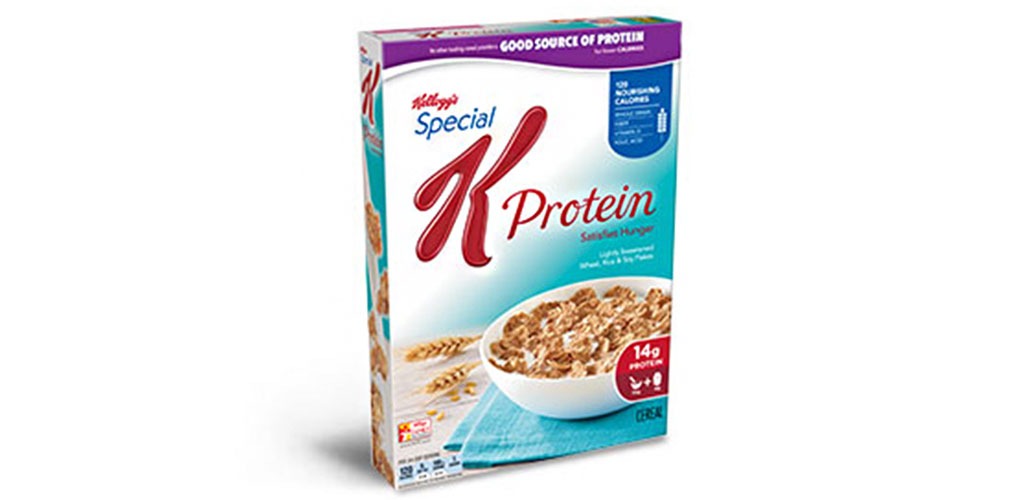
Per 1 cup: 160 calories, 1.5 g fat (0 g saturated fat), 250 mg sodium, 25 g carbs (4 g fiber, 9 g sugar), 13 g protein
Protein is all the rage right now and for good reason. The nutrient can fill you up, boost your metabolism, and help you burn fat. Unfortunately, the majority of the 13 grams of protein in this cereal comes from soy protein isolate, which is most likely extracted from genetically modified, pesticide-laden soybeans. Another reason to steer clear? Kellogg’s sweetens up the cereal with sucralose, an artificial sweetener that won’t shut off your hunger hormones like real sugar can.
Post Selects Blueberry Morning
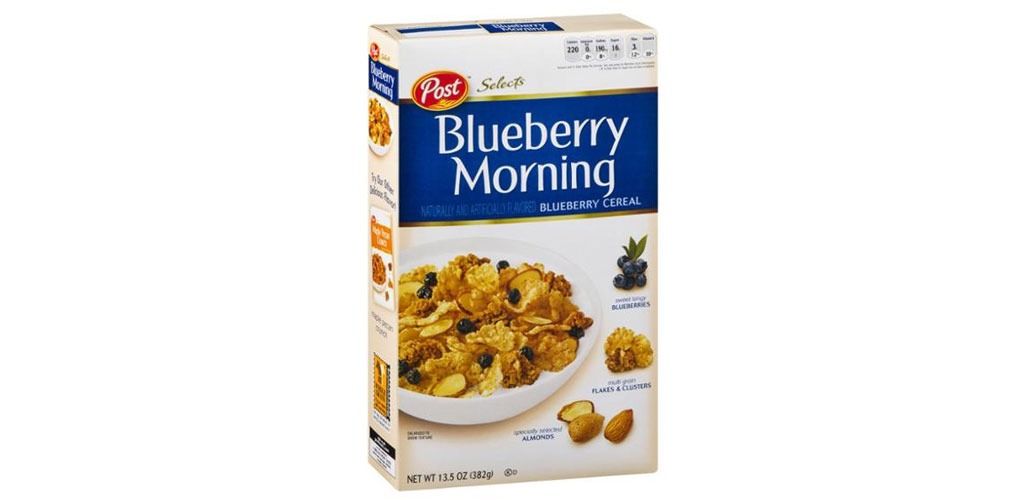
Per 1 cup: 175 calories, 2.5 g fat (0 g saturated fat), 150 mg sodium, 36 g carbs (2 g fiber, 13 g sugar), 3 g protein
A summary of the ingredients list: rice, sugar, wheat, sugar, rolled oats, sugar, dried blueberries, sugar, oil, artificial colors, and flavors. This should be a hard pass.
Special K Nourish Coconut Cranberry Almond
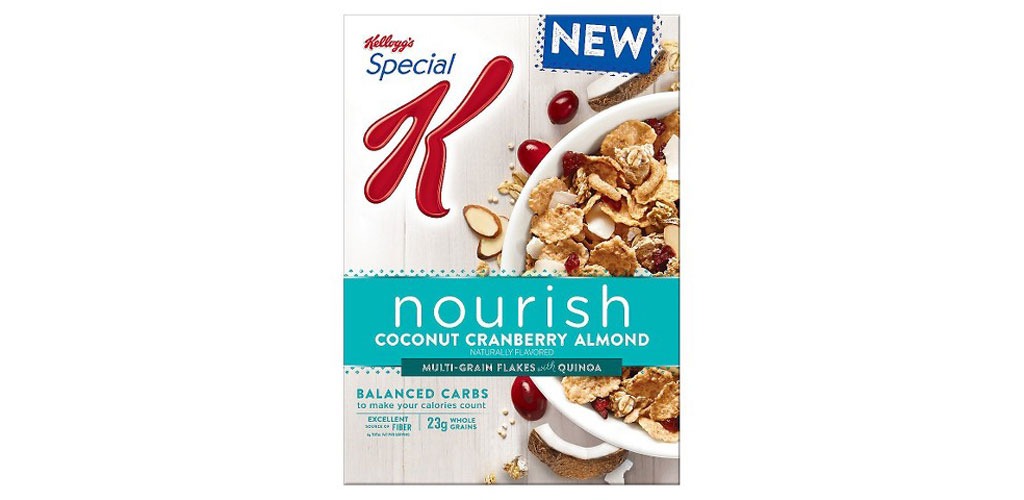
Per 1 cup: 200 calories, 4 g fat (2 g saturated fat), 160 mg sodium, 40 g carbs (5 g fiber, 11 g sugar), 5 g protein
If it weren’t for the seven different types of sweeteners added to this cereal, sugar would be the first item found on the ingredient list. If you want to nourish your system, try doing so without ingesting highly processed foods like soy protein isolate, modified corn starch, acacia gum, and the potentially carcinogen-containing preservative, BHT.
Quaker Oatmeal Squares Golden Maple
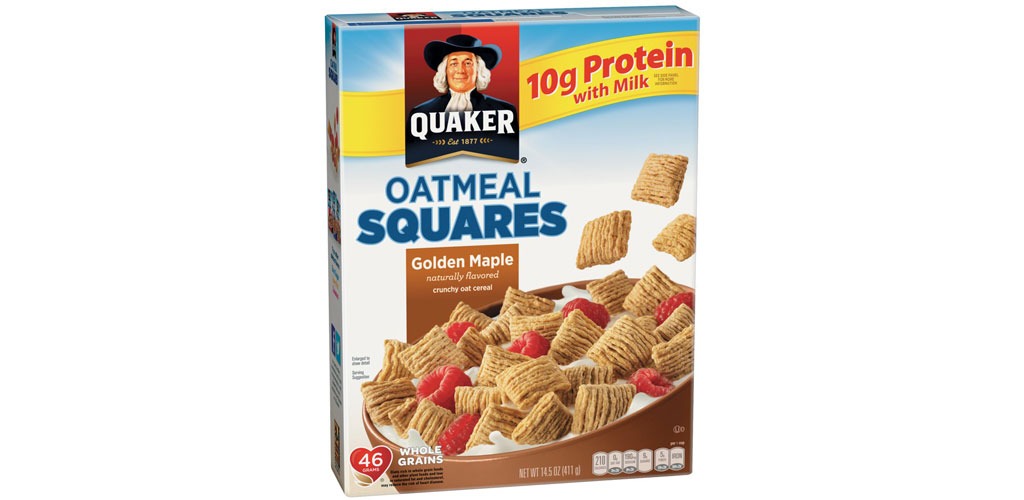
Per 1 cup: 210 calories, 2.5 g fat (0 g saturated fat), 190 mg sodium, 44 g carbs (5 g fiber, 9 g sugar), 6 g protein
Don’t let their high fiber and protein counts fool you. These oatmeal squares are full of bad-for-you ingredients yellow 5 and 6 as well as caramel color—a chemically-derived additive which commonly contains an artificial form of phosphorous that’s been shown to leach calcium from our bones. (Oh and P.S., the “Honey Nut” Oatmeal Squares flavor has no actual honey listed anywhere on the ingredient list.)
Special K Fruit & Yogurt
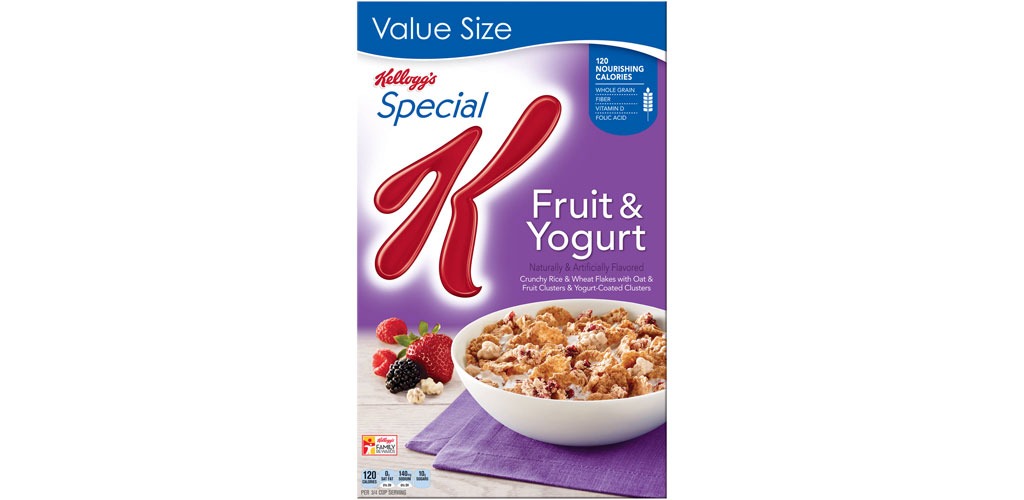
Per 1 cup: 160 calories, 1.5 g fat (0 g saturated fat), 185 mg sodium, 36 g carbs (4 g fiber, 13 g sugar), 3 g protein
If you’ve heard some of the benefits of yogurt, you’d likely pick up this cereal. Between being high in muscle-building protein and full of gut-healing probiotics, Greek yogurt is the rising star among breakfast foods. Just don’t let that cloud your judgment when it comes to grabbing this box. Kellogg’s uses nonfat yogurt powder that’s heat treated (and, thus, contains no probiotics), and throws in a medley of inflammatory sugars, artificial flavors, and artificial colors that will knock your gut health off track.
Quaker Corn Bran Crunch
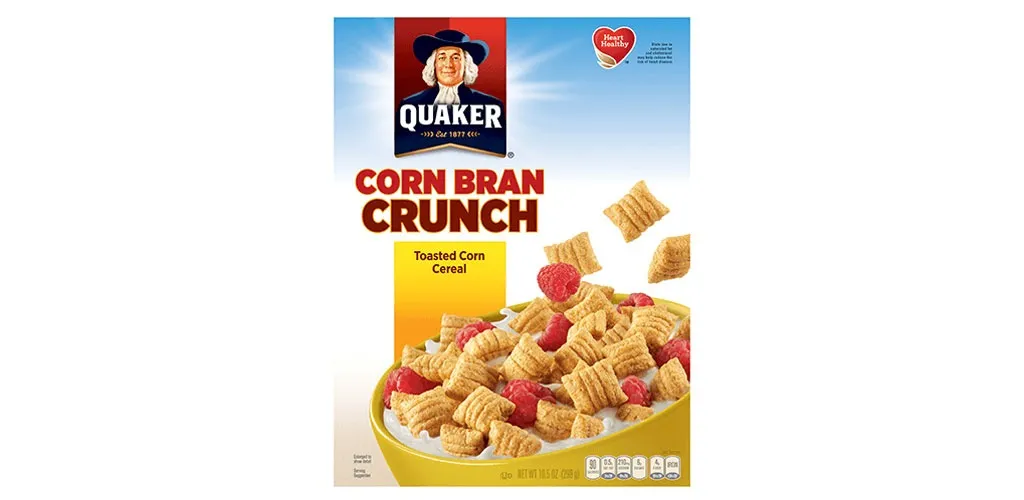
Per 1 cup: 120 calories, 1.5 g fat (0.5 g saturated fat), 280 mg sodium, 31 g carbs (5 g fiber, 8 g sugar), 3 g protein
It’s not the nutritionals that did Quaker Corn Bran Crunch in. It was their addition of artificial colors—Yellow 5, Yellow 6, Red 40, and Blue 1. Red 40 and the two Yellows have both been banned from food products in the UK based on research that has connected the oil-derived colorants with allergies, migraines, headaches, behavioral problems, and hyperactivity among children.
Chex Clusters Fruit & Oats
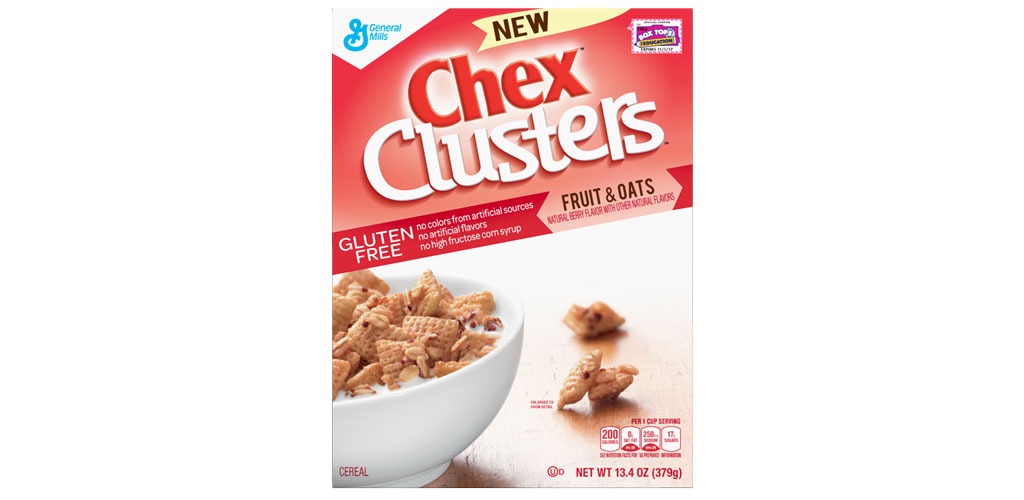
Per 1 cup: 200 calories, 1.5 g fat (0 g saturated fat), 250 mg sodium, 45 g carbs (1 g fiber, 17 g sugar), 2 g protein
General Mills splatters health-sounding claims like “Gluten-Free,” “No Colors from Artificial Sources,” “No Artificial Flavors,” “No High Fructose Corn Syrup” on their box, but they forgot to mention there are 17 grams of sugar in a cup serving. Oops!
Nature’s Path Chocolate Koala Crisp
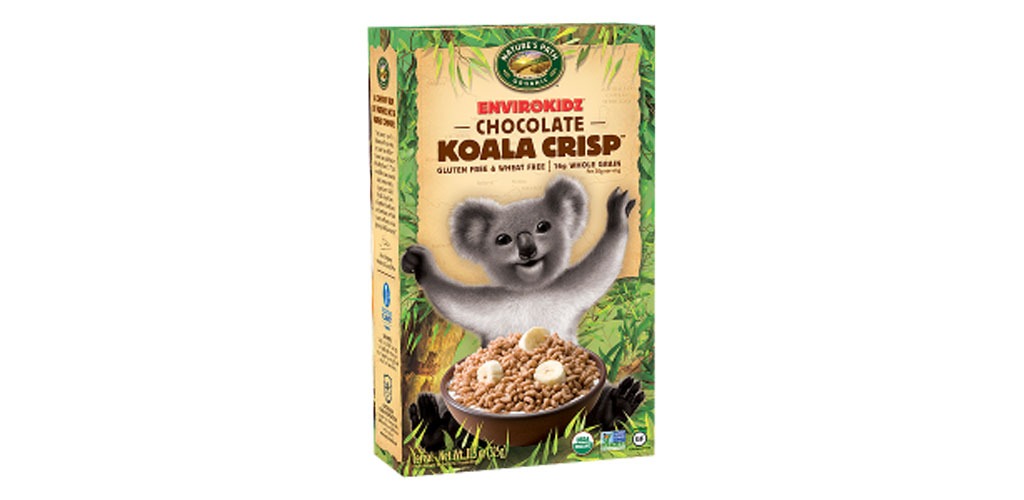
Per 1 cup: 147 calories, 1.5 g fat (0 g saturated fat), 130 mg sodium, 19 g carbs (3 g fiber, 15 g sugar), 7 g protein
We were initially disappointed to see that Nature’s Path uses brown rice flour, rather than a whole grain, in this cereal. But what really cemented their spot on our worst healthy cereals list was the 15 grams of cane sugar and molasses they add per serving—too much for you or your little one.
Kellogg’s Origins Fruit & Nut Blend
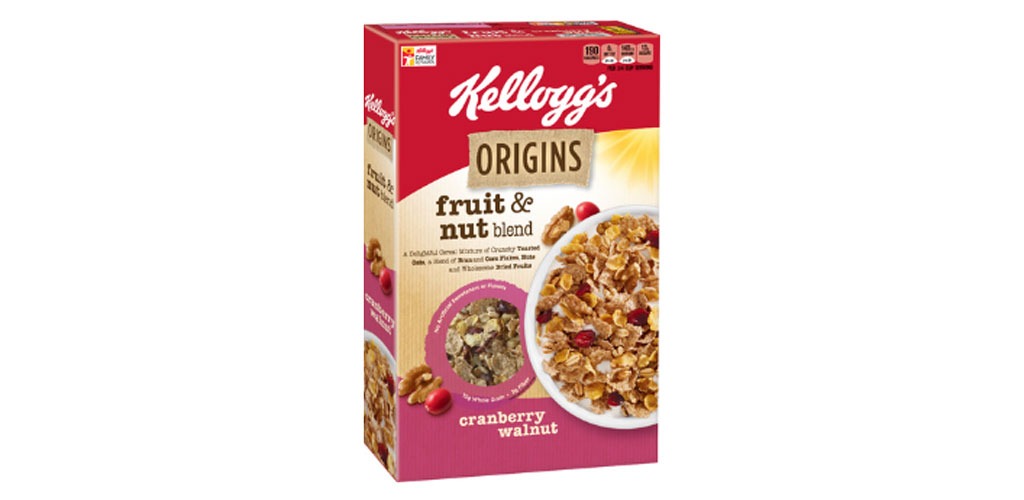
Per 1 cup: 253 calories, 5 g fat (0 g saturated fat), 187 mg sodium, 51 g carbs (4 g fiber, 17 g sugar), 4 g protein
Always be wary of any processed foods that contain cranberries. This berry was ranked last on our list of fruits ranked by sugar content because it’s so low in the sweet stuff. Unfortunately, that usually means that manufacturers add more sugar to make up for their bitter taste, as you can see with the 17 grams of sugar, glycerol, corn syrup, honey, and molasses.
Raisin Bran
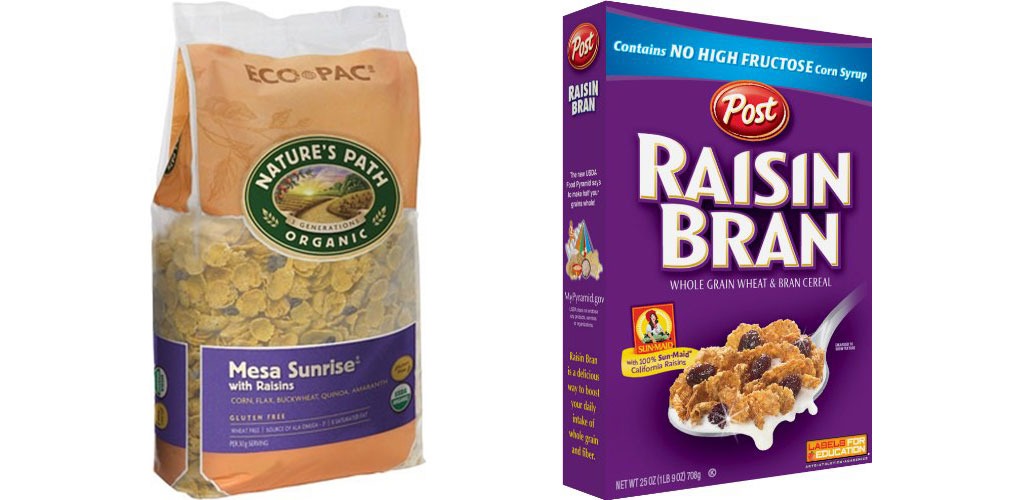
Nature’s Path Organic Mesa Sunrise Flakes with Raisins
Per 1 cup: 210 calories, 1 g fat (0 g saturated fat), 200 mg sodium, 47 g carbs (2 g fiber, 12 g sugar), 3 g protein
Post Raisin Bran
Per 1 cup: 190 calories, 1 g fat (0 g saturated fat), 230 mg sodium, 47 g carbs (8 g fiber, 19 g sugar), 5 g protein
It’s long held the reputation of being one of the few healthy cereals, but that’s mostly because of the “bran” part of the equation. Fruits are healthy, but dried fruits should be eaten in moderation because they don’t fill you up as much as water-filled fresh fruit and are higher in sugar. Each of these boxes contains 10 or more grams of sugar compared to fiber per serving, which is higher than what is expert-recommended. If you want healthy raisin bran, check out Cascadian Farm Organic Raisin Bran, which has 6 grams of fiber and only 13 grams of sugar per cup serving, or Erewhon Raisin Bran, which has 6 grams of fiber and 10 grams of sugar per cup serving.
Kellogg’s Raisin Bran, Omega-3
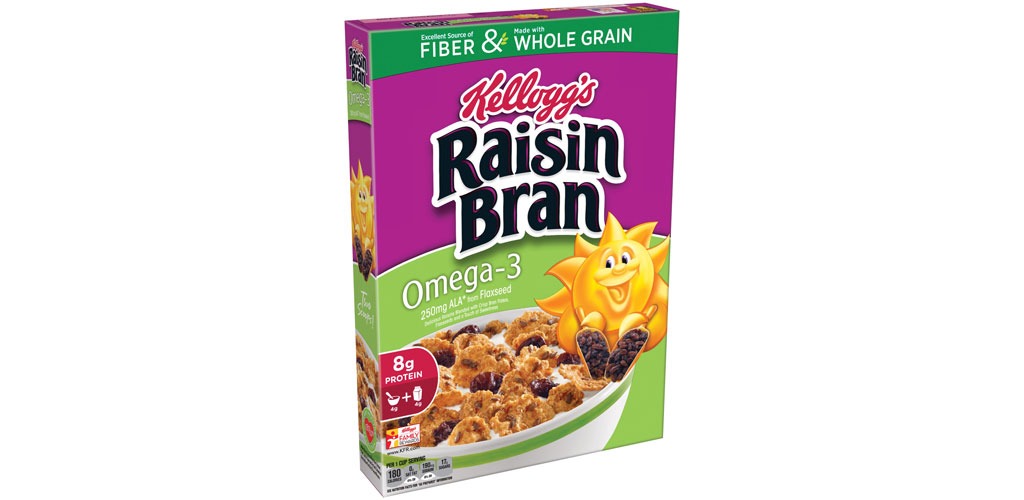
Per 1 cup: 180 calories, 1.5 g fat (0 g saturated fat), 190 mg sodium, 44 g carbs (5 g fiber, 17 g sugar), 4 g protein
Kellogg’s version of raisin bran deserved its own spot. That’s because they attempt to deflect attention away from their 17 grams of sugar by selling their cereal as healthy with the claim “Omega-3” from the added flax seeds. While omega-3s are a healthy fat that’s been found to decrease inflammation and boost brainpower, you, unfortunately, won’t be able to reap much of their benefits in this way. In fact, flaxseeds are one of the foods you’re eating wrong because often times, people eat them whole—as you would in this cereal. Your body can’t break down the whole flaxseed, so you have to grind them up first to reap their heart-healthy omega-3s.
